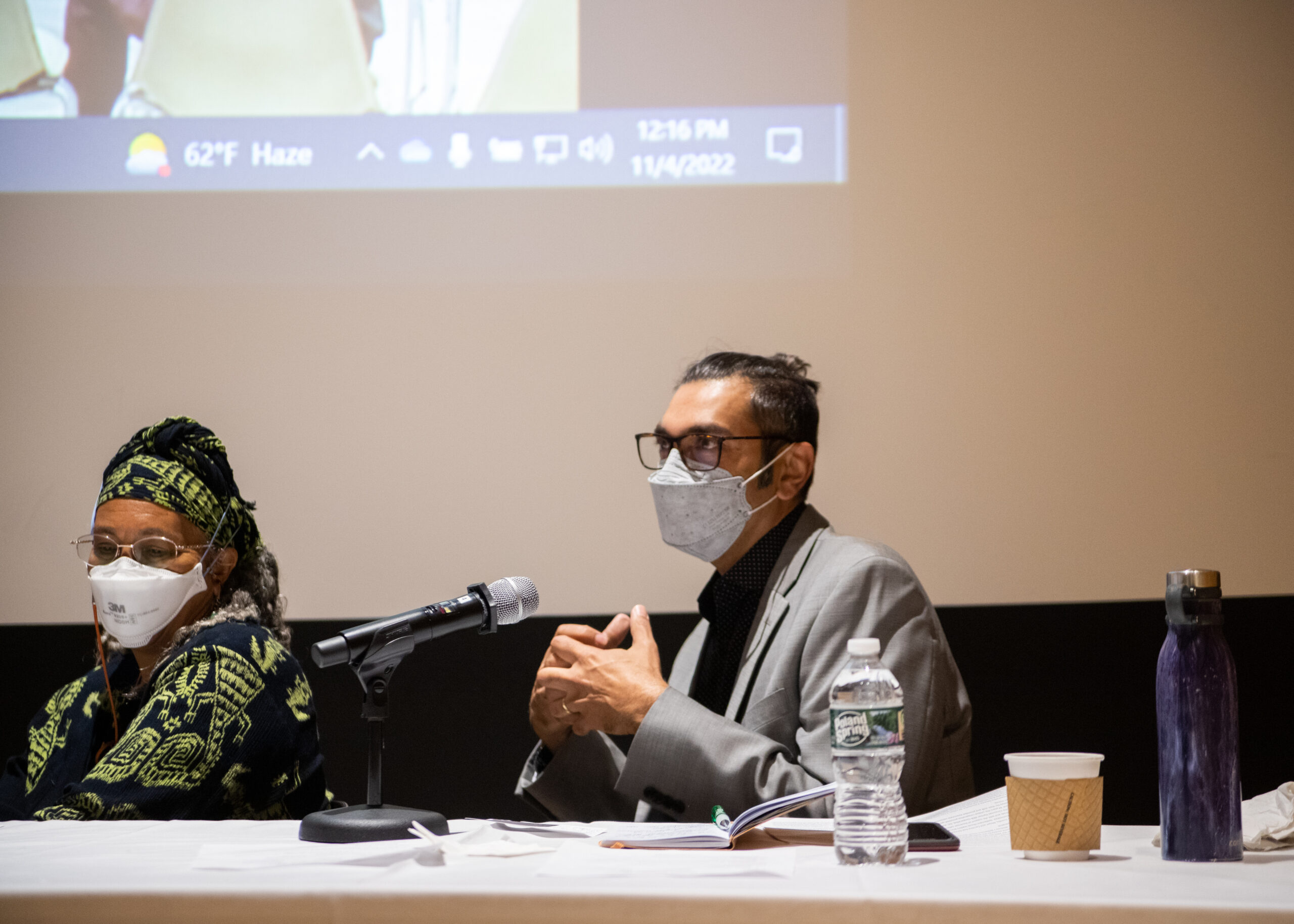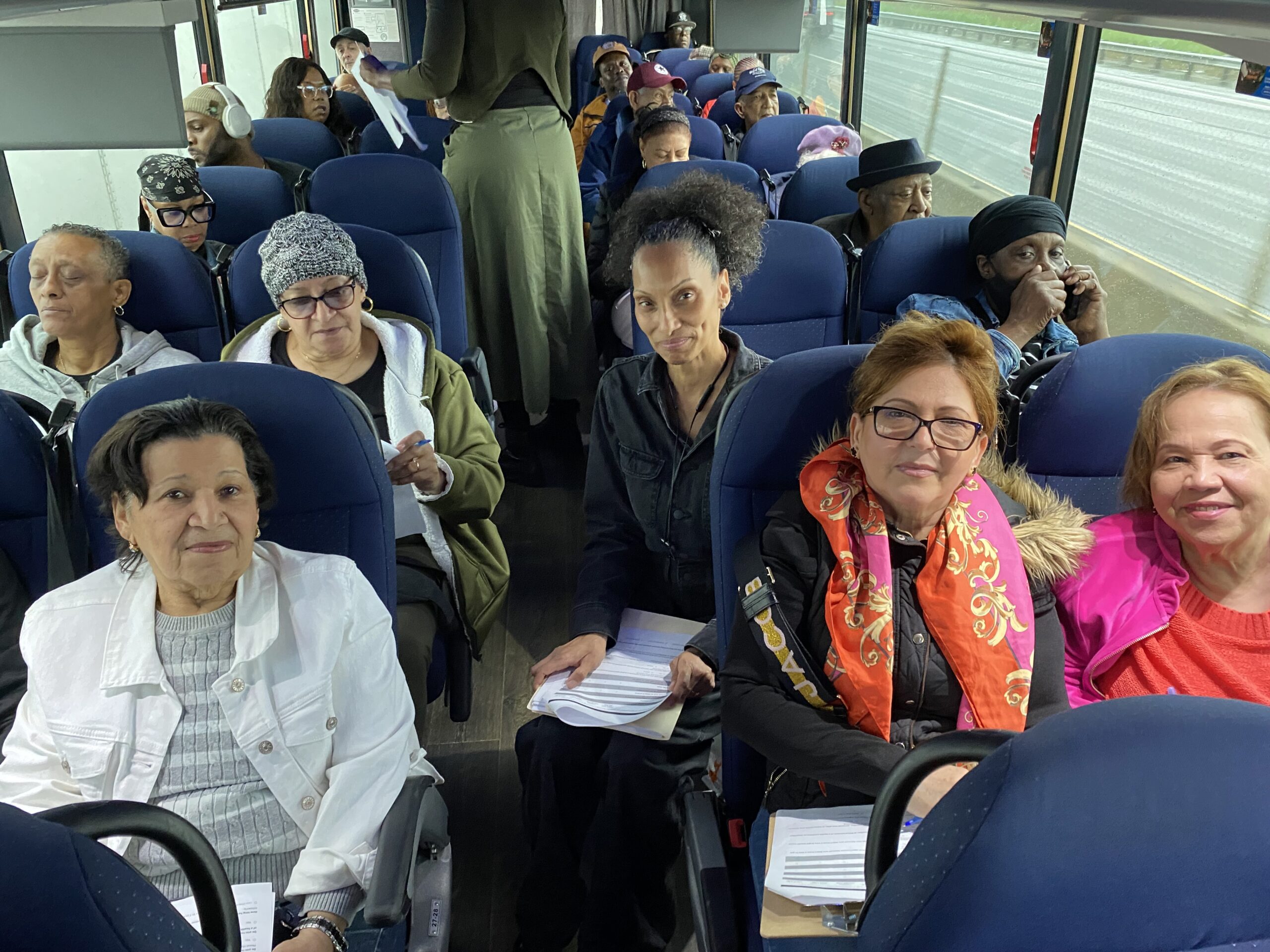ANNIVERSARY CELEBRATION (1937-2022)
COOPERATIVE DEMOCRACY CONFERENCE
The Segal Theater
CUNY Graduate Center 365 Fifth Ave
NOVEMBER 4, 2022
IRMA RODRIGUEZ, Parodneck Foundation Board President
Email: irmaerodriguez@gmail.com
Irma Rodriguez served as Executive Director of Queens Community House from 2008 to 2015; prior to that, she spent 25 years as the organization’s Associate Director. Queens Community House is a multi-site settlement house serving the diverse populations of Queens through a combination of social services, educational advancement, advocacy, and leadership development.
During Irma’s time at Queens Community House (QCH), it grew from a locally-serving community center into a borough-wide organization with 25 sites in 11 neighborhoods and serving 25,000 children, families and older adults. Under her guidance, QCH developed a particular expertise in organizing, neighborhood preservation, and community building. She has been acknowledged for her efforts to promote human service provision as a vehicle for social change.
Since her retirement Irma has served as part time Executive Director 0f The International Federation of Settlements, and as consultant to the national Community Learning Partnership.
Irma has taught courses in community organization, social administration, and social work field instruction at several local universities. She has published articles on housing, the court system, and human rights and has served on numerous boards throughout her career, including City Project, The Association for Neighborhood and Housing Development, The Parodneck Foundation for Self-Help Housing, NY Women’s Foundation, and the International Federation of Settlements. Irma served on David Dinkins’ Mayoral Transition Team, and her work has been recognized by City Limits, The Center for an Urban Future and Asian Americans for Equality, among others.
Irma is a graduate of The City College of New York/CUNY with a BA in Fine Arts and received her MSW in 1980 from the Hunter College School of Social Work. She is a resident of Sunnyside Gardens, and was a leader in that neighborhood’s effort to secure Historic District status.
Welcome: Harold DeRienzo, The Parodneck Foundation
hderienzo@parodneckfoundation.org
Mr. DeRienzo began his career in community development working with residents on Kelly Street in the South Bronx in the 1970s. In 1982, Mr. DeRienzo was recruited to head up the Parodneck Foundation for Self-Help Housing and Community Development, Inc. In November 2002, at the request of the New York State Attorney General’s office, Mr. DeRienzo returned to Banana Kelly to help rescue it from bankruptcy. From a staff of six and a failing housing portfolio of 566 units in 2002, at the time of his semi-retirement in 2019 the organization the organization’s portfolio grew to over 1600 units, with a staff of over 40, not including service employees.
Socially and organizationally, Mr. DeRienzo facilitated the return of the organization to its residents. Through a change in its by-laws, Banana Kelly transformed from a housing services organization to a centralized mutual housing association, with residents making up a plurality of the board, drawn from a Residents Council.
Mr. DeRienzo has been published in local, national and international community development, real estate and civic publications. In 2008, The Concept of Community, Lessons from the Bronx, was published by IPOC Press. A second book, (Building Homes/Building Community) was published in June 2021 along with a third book (Preventing the Next American Civil War, How Culture, Community and Democracy Frame Human Progress), available through Barnes & Noble. A fourth book, Coming of Age in an Era of Political Apostacy, is currently with a publisher but the Introduction and Chapters can be found on the blog page of my website (www.communitycivics.com), along with information about the other book publications.
Program Overview: Rebecca Lurie, Community and Worker Ownership Project, School for Labor and Urban Studies, City University of New York
Rebecca Lurie is currently on faculty with the Urban Studies Department and the founder of the Community and Worker Ownership Project at the City University of NY School for Labor and Urban Studies. She was a founding member of the worker-owned cooperative, New Deal Home Improvement Company and City Roots Contractors Guild. She began her working career as a union carpenter and transitioned into worker education through the union’s apprenticeship program and the construction industry. Using a sector approach for understanding industries and businesses and their employment needs, she has remained dedicated to inclusive community economic development. Rebecca has collaborated on numerous initiatives in NYC, including pre-apprenticeship programs, a Bronx green jobs network, a kitchen business incubator and the design of Best for NYC. She was a founding member of the board of the Bronx Cooperative Development Initiative, is secretary of the board of the Democracy at Work Institute and serves on the executive committee of the Union Coop Council/US Federation of Worker Coops. She is Trustee Emerita with the Brooklyn Society for Ethical Culture. She holds a Master’s in Organizational Change Management from The New School, a certificate in Adult Occupational Education from CUNY and is certified in Permaculture Urban Design. She is a native New Yorker raised by a fervent activist with the DNA and tireless passion for social justice.
Moderator: Dr.Jacqueline Mondros, Professor and Dean Emeritus Stony Brook University School of Social Welfare –
jacqueline.mondros@stonybrook.edu
Dr. Jacqueline B. Mondros, D.S.W., is Professor and Dean Emeritus of the School of Social Welfare where she was also Assistant Vice President of Social Determinants of Health at Stony Brook University SUNY. She is past president of the National Deans and Directors of Social Work and co-director of the Leadership Academy for Deans and Directors of Social Work.
Dr. Mondros received her masters and doctorate from University of Pennsylvania. Her research interests are in the study of urban neighborhoods and she has written extensively on community social services, community development, and community organization. She is the recipient of numerous grant awards, most recently in the area of aging in place. The second edition of her co-authored text, Organizing for Power and Empowerment: The Fight for Democracy, an internationally recognized textbook in community organizing, will be published in December 2022.
Before entering academia, Dr. Mondros had a successful career in social work practice. She was director of clinical services at a school for girls and executive director of a settlement house in Philadelphia. She has won numerous awards including the NASW Top Leader award for New York City, and the Elizabeth Hurlock Beckman Award for Community Service. She has been appointed by three mayors to the New York City Age Friendly Commission and has served since 2014. She has remained a dedicated community activist, working to bring the resources of academia to effect change in local communities throughout the country.
PANEL A. History and Context
Topic 1: Cooperative History, with an emphasis on the Black Community; Current Potential for a Future Equitable Economy
Guest Speaker: Dr. Jessica Gordon Nembhard, John Jay College, Department of Africana Studies, and author of Collective Courage, A History of African American Cooperative Economic Thought and Practice
Email: jacqueline.mondros@stonybrook.edu
Author of Collective Courage: A History of African American Cooperative Economic Thought and Practice (2014), and 2016 inductee into the U.S. Cooperative Hall of Fame, Jessica Gordon-Nembhard, Ph.D., is Professor of Community Justice and Social Economic Development, in the Department of Africana Studies, John Jay College, City University of NY. Dr. Gordon-Nembhard is a political economist specializing in cooperative economics, community economic development and community-based asset building, racial wealth inequality, solidarity economics, Black Political Economy, and community-based approaches to justice. She is co-editor with Ngina Chiteji of Wealth Accumulation and Communities of Color (University of Michigan Press 2006). She is a member of the Cooperative Economics Council of NCBA/CLUSA; the International Co-operative Alliance Committee on Co-operative Research; a Faculty Fellow and Mentor with the Institute for the Study of Employee Ownership and Profit Sharing at Rutgers University School of Management and Labor Relations; and an affiliate scholar with the Centre for the Study of Co-operatives (University of Saskatchewan, Canada). Gordon-Nembhard is also a past board member of the Association of Cooperative Educators; a past fellow with the Center on Race and Wealth at Howard University; and a member and past president of the National Economic Association. She is the proud mother of Stephen and Susan, and the grandmother of Stephon, Hugo, Ismaél and Gisèle Nembhard.
Topic 2: History of Housing Cooperatives and Potential for Growth and Support of the Cooperative Sector Generally
Guest Speaker: Ken Wray, Executive Director, The Parodneck Foundation
Email: kwray@parodneckfoundation.org
Ken Wray has been active in affordable housing for several decades. He started his career in one of New York’s garment unions when labor was one the city’s major developers of cooperative middle-income housing and served as the Executive Director of the United Housing Foundation, a consortium of unions and financial institutions, for ten years. In the early 1990’s, he was one of the founding members of CATCH as we began our efforts to develop tenant-run mutual housing associations in distressed neighborhoods in Harlem, Washington Heights, Brooklyn and the South Bronx. More recently, he’s served as a Vice-President at Westhab, Inc., directing housing and social services operations for low- and very low-income households in Westchester County, NY. In that time he acquired extensive experience serving the needs of at-risk populations especially those with unique needs, including Veterans and the mentally disabled. Ken received his BA from Columbia University and his MS from Columbia’s Graduate School of Architecture, Planning and Preservation.
Topic 3: Historical Racism in the Government and Private Sector Housing Financing Sector and The Need to Address These Historical Discriminatory Practices
Guest Speaker: Gregory Jost, Banana Kelly and Fordham University
Email: gjost@bkcianyc.org
Gregory Jost is a Bronx-based organizer, educator and facilitator with expertise in the history of structural inequality and strategies for racial equity through community reinvestment and control. He is an Adjunct Professor of Sociology at Fordham University where he focuses on the Bronx's history with redlining and grassroots approaches to systemic issues. Gregory's work at Banana Kelly Community Improvement Association in the South Bronx keeps him grounded in current campaigns fighting back against the extractive economy, and fighting forward for community ownership and economic democracy. He has extensive experience in co-designing curricula, interactive exhibits, databases and popular education workshops. He is currently writing a book on the Bronx's battles against redlining while working to co-create the Bronx People’s Federal Credit Union as a collaboration between the Bronx Financial Access Coalition and the Lower East Side People’s Federal Credit Union.
PANEL B. Meeting Current and Future Needs
Topic 4: Growing Our Own Food: Community Gardens, Food Cooperatives and Community Supported Agriculture
Guest Speaker: Sheryll Durrant, Just Food and Kelly Street Garden
Email: sherylldurrant@gmail.com
Sheryll is an urban farmer, educator, and food justice advocate. She has been the Resident Garden Manager at Kelly Street Garden since 2016, and is also the Food and Nutrition Coordinator for New Roots Community Farm, managed by International Rescue Committee (IRC). Her work has included developing community-based urban agriculture projects, providing expertise and technical assistance for gardens within supportive housing developments, and she currently serves as Board President for Just Food. Sheryll has led workshops and spoken on issues related to urban agriculture and food justice for many key organizations and was part of the 2019-2020 HEAL School of Political Leadership cohort. As a former Design Trust fellow for the Farming Concrete project, she is now responsible for communications and outreach for the data collection platform that helps urban farmers and gardeners measure their impact. Prior to her work in urban agriculture, Sheryll spent over 20 years in corporate and institutional marketing.
Topic 5: Local Control of Public Land
Guest Speaker: Edward Garcia, Northwest Bronx Community and Clergy Coalition.
Email: edward@northwestbronx.org
Edward Garcia is a proud Bronx resident who has lived in the borough since he moved to New York City from the Dominican Republic as a teenager. As a Community Organizer for the Northwest Bronx Community and Clergy Coalition, Edward has worked to build tenant leadership and community power to fight against predatory landlords and address poor conditions in apartment buildings while building issue campaigns that create change at a broader scale. Edward began his work as a social justice activist while attending Walton High School where he called attention to the school's limited resources being spent on metal detectors and security, rather than college counselors, SAT preparation or student support. He became involved in the School Closure Campaign and joined Sistas and Brothas United, the youth organizing arm of NWBCCC. Edward started his undergraduate experience at Lehman College and graduated from City College. Edward currently serves as the director community development for NWBCCC leading the Bronx Community Land Trust Program.
Topic 6: Community Land Trusts
Guest Speakers: Athena Bernkopf, East Harlem/El Barrio Community Land Trust
Athena is a cross-pollinator tending to the intersecting roots of black and queer liberation, and land, housing, and healing justice. Raised in Bed-Stuy, their work as organizer and facilitator has taken them across New York City in roles such as cop watch and community safety trainer with Harlem Cop Watch, tenant rights and anti-displacement advocate at the Legal Aid Society, and core member of The Audre Lorde Project's 3rd Space Wellness Collective. Currently they serve as Project Director at the East Harlem/El Barrio Community Land Trust (EHEBCLT), where they work to build out infrastructure for community ownership and tenant-led governance of land and housing. Athena represents EHEBCLT on the coordinating committee of the New York City Community Land Initiative (NYCCLI). They are also a member of the New York City Network of Worker Cooperatives’ (NYCNOWC) Training Collective, where they facilitate popular education-based learning spaces that deepen capacity for sustainable, consensus-focused coop structures. Driven by a vision of cityscapes abundant in ancient trees taller and more common than skyscrapers, they are committed to co-creating urban futures whose foundations are rooted in mutual care, collective stewardship of resources, and being in right relationship with land.
PANEL C. Reorganizing Capital and Labor
Topic 7: Community Development Credit Unions, Public Banking, and Democratizing Finance
Guest Speaker: Deyanira Del Rio, New Economy Project
Deyanira (she/her) is the co-director of New Economy Project, a citywide organization that works with community groups to build a just economy rooted in racial and neighborhood equity, cooperation, and ecological sustainability. Deyanira has worked for 25 years to promote cooperative and community-controlled finance, immigrants’ economic rights, and equitable neighborhood development in New York City. At New Economy Project, she has worked with coalitions to fight systemic wealth extraction and inequality in our financial system and economy, and to promote community land trusts, public banking, and neighborhood-led development. She also co-designed the organization's foreclosure prevention, DACA, and new economy loan funds. Deyanira is a board member and former chair of the Lower East Side People’s Federal Credit Union, a citywide financial cooperative serving historically redlined communities, and previously worked at Inclusiv (fka National Federation of Community Development Credit Unions), among other roles.
Topic 8: Worker Cooperatives
Guest Speaker: Emmanuel Pardilla, New York City Network of Worker Cooperatives
Emmanuel is a communist, vegan, writer and the son of black poor-working class Dominican immigrants that found their way to the US after enduring years of dictatorship in the Dominican Republic. He is a volunteer tenant organizer with a grassroots mass organization known as the South Bronx Tenants Movement where he organizes Black & Brown tenants in his neighborhood of Mott Haven. Being involved in a range organizing fights throughout the years has shaped and molded his worldview and commitment to social change. He graduated with his Master in Labor studies from the CUNY School of Labor and Urban Studies. And in his free time, you’ll find him either riding his bike around or out of the city, or chilling at the Uptown Veg juice bar drinking a random natural juice with a lot of ginger.
Topic 9: Cooperation Among Cooperatives
Guest Speaker: Ali Issa, Cooperative Economic Alliance of New York City
Ali Issa - General Coordinator of the Cooperative Economics Alliance of NYC. For over a decade, Ali Issa has taken part in a variety of fights for social justice and has worked to connect the dots across issues. He previously worked with War Resisters League, organizing against police militarization and helping build cross-community coalitions in cities around the country, in addition to building solidarity with movements in Iraq and across the Middle East. He has also worked with the Urban Justice Center’s Street Vendor Project, organizing alongside vendors fighting for their rights in all five boroughs. Most recently, Ali worked with New Economy Project as lead organizer with the Public Bank NYC coalition, pushing to make public money work for the public good. Originally from Iowa, Ali holds a Master’s degree in Arabic Studies from the University of Texas at Austin and is the author of the book Against All Odds: Voices of Popular Struggle in Iraq. Ali is a committed fan of improvised music and lives in Sunset Park, Brooklyn.
Wrap-up and Putting Together the Pieces
Guest Speaker: John Krinsky, City College
John Krinsky is a professor of political science at the City College of New York and the CUNY Graduate Center. He is the director of the Community Change Studies program at City College. Krinsky holds a doctorate in sociology and a master's degree in urban planning. He studies urban politics, social movements, work, welfare, and housing, and is a founding board member of the New York City Community Land Initiative (NYCCLI). He is the author of Free Labor: Workfare and the Contested Language of Neoliberalism (2008) and, with Maud Simonet, Who Cleans the Park? Public Work and Urban Governance in New York City (2017), as well as a co-editor (with Colin Barker, Laurence Cox, and Alf Gunvald Nilsen) of Marxism and Social Movements (2013). He has also published numerous articles on movements, public work, and housing in New


